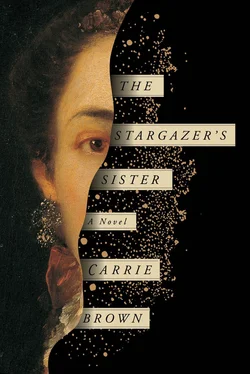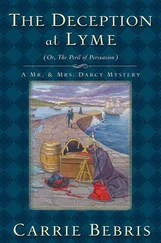She remembers William smiling at her on the day of their departure from Hanover so many years ago, telling her to hurry. She remembers the money he gave to their uncle for Hilda’s care.
She is glad that Hilda’s life has not been unhappy. William had once read aloud to Lina a letter from Alexander in which he related that their uncle always gave Hilda a glass of wine at night, over which she smacked her lips loudly, making them all laugh.
The Angelus bell rings. Lina and Silva stand in the corridor.
“Tell them that they must feed her cake every day, if she wishes it,” Silva says. “Wine, if she likes. Whatever she wants. I can leave them with plenty of money. She may have every comfort.”
Lina kisses his hands. “Obviously I am never to have money of my own,” she says. “I am grateful to you.”
“You should have had a fortune,” Silva says, “for all your work.”
“I should have had independence to do my own deeds, for good or ill,” she says.
Silva kisses her. “Yes,” he says. “That is what I meant.”
“I don’t know if I shall see her again,” Lina says.
Silva takes her arm. “You are both happy now,” he says. “Listen to the beautiful voice of that bell.”
—
ON THE LAST DAY of their visit, Lina and Silva go to the Herschels’ old house. They inquire of the neighbors — some relations of the Hennings still live next door — but no one seems to know what has become of Jacob. Lina imagines him, a bent little old man, his face even darker and more contemptuous than ever, his fingers bony and grasping.
The occupants of the house have heard of the great William Herschel and his telescope, of course, and they welcome Lina and Silva with courtesy, offering wine and cake in the front room. Some of the furnishings are the same — a bench before the fire, a table, two chairs. Lina finds that she cannot sit down anywhere.
Her mother’s ghost, her father’s ghost. They are all around her. But not William’s.
She tries the bench but stands up quickly.
She has been waiting to feel William near her — longing for it — but it has not happened yet.
“May I walk through the orchard?” she asks.
Night has fallen, but the moon is full. Though it is late fall, the air is mild. She crosses the courtyard, and she can smell even before she reaches the stable that there is a horse inside. She opens the door, closes it behind her. The stable is in darkness, but she moves by memory to the old stall, slides the smooth wooden latch, and steps inside, her hand finding the horse’s neck. He bobs his head up and down in agitation until she blows into his nostrils, as she used to do for their old horse. He quiets, only stamping his foot from time to time, while she rests her forehead against his shoulder. The smell of his feed — bran laced with molasses — is sweet.
Inside the house, she knows, Silva will be doing his gallant best in his limited German.
She runs her hand along the horse’s back, then turns to reach up to the windowsill. In a corner she finds the pebble she left there so many years before, the little white stone she had picked up in the orchard on the day she and William left for England. It is ice cold and smooth in her hand. She slips it into her pocket.
—
THE SHOPS IN HANOVER are lit prettily with gas, and in the marketplaces lighted booths are open in the evenings. She and Silva stroll back to their hotel that night, her arm tucked in his. Festive garlands of greenery have been strung along the streets. Everyone — cooks and housemaids, gentlemen and butchers — walks among the booths and purchases hot wine and sweets and pretty indulgences: knitted bags and purses, framed embroideries, hats and gloves. The air is warm from braziers where the chestnut roasters stand shaking their baskets.
At the hotel, she lies beside Silva in bed.
“You are missing the sunlight, my dear friend,” she says. “You are tired.”
He turns to her on the pillow and strokes her hair. “You have done what you need to do?”
“I don’t know,” she says. “But thank you. Let us go back to your lovely island.”
—
IN LISBON, Silva sits for long hours in the winter sun.
The next October, they observe a great number of shooting stars. They sit side by side on the villa’s terrace at night. The sky is illuminated with extraordinary streaks of light. They stare, transfixed at the sight, surrounded by the beautiful anatomy of Silva’s marble sculptures, the scents of lavender and plumeria.
Lina makes her way through many years of her journals, working to create a complete narrative from notes and lists of visitors, records of William’s travels and purchases. Her silence — her failure to write anything at all about their daily lives — lasted almost eight years, those years now mostly lost to her by comparison with the years for which she has recordings in her daybooks.
Her hurt and her anger had been so great.
What had made her pick up her journals again, after so long? She considers the date on which her more recent entries begin, calculates, though her journals make no reference to it, that she must have begun to write again soon after her quarantine for the blindness that the doctor feared would afflict her forever. Perhaps it was the thought of losing the visible world that made her return to recording it: the day’s weather; what had been served at dinner; shooting stars, comets, and partial eclipses; once, a bat in the chimney; any event, no matter how trivial, as if she felt the numbers of them before her diminishing.
She remembers William at her bedside playing the cello in the darkness, his head bent, his palm on her cheek. Remembers the snow on the bedclothes.
William had loved her. She had always known that. That had never been in question.
After years of silence in her daybooks, there is simply an entry, ordinary as anything, about a visit from Stanley and the boys at Observatory House for Sunday dinner, an order for a spring lamb, and an amount to be paid for ink.
That is how forgiveness is made, she thinks. Patiently.
—
SILVA DIES IN HIS SLEEP beside her one night after ten years together. When she wakes, his body is turned toward her, and she lies for a long time next to him, looking at his face, watching the beautiful light creep slowly across the ceiling until full sun lies across them.
It costs her a great deal to leave their bed.
When she stands at last to draw the sheet over his face, she finds she cannot do it.
She calls the servants, who help her to a chair beside the bed, Silva’s hand still held in hers.
It is her only consolation that she believes he knew how much he gave her: that first night, unbraiding her hair. All the nights that followed.
Indeed. Her body had many uses, after all.

Why, in the end, does she return to Hanover?
Why not remain in the sunlight in Lisbon surrounded by the comforts of Silva’s villa? Why not go back to the familiar, lovely mists of England, to Observatory House or her little cottage?
At Hilda’s bedside in the convent, leaning on a stick, Lina entertains the young postulants, ticking off the events of her and Hilda’s long lifetimes for them: the great earthquake in Lisbon, the American War, the old French Revolution, the rise and fall of Napoleon, the development of the railroad and electric telegraph and gaslights, two kings crowned in England, and now the reign of Victoria begun.
The nuns hold their fingers before their mouths, amazed.
Читать дальше













